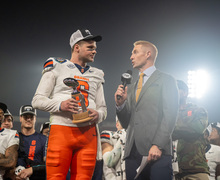Authors with divergent viewpoints on race to speak in campus conversation on March 31
Isabella Flores | Contributing Photographer
Syracuse University Vice Chancellor, Provost and Chief Academic Officer Gretchen Ritter said she wants an upcoming discussion event with two best-selling authors to bring about debate and dialogue among SU students on the biggest challenges within the U.S. today. Authors Michael Eric Dyson and John McWhorter, who hold divergent viewpoints on racial issues and identity, will speak during a March 31 campus conversation on the state of American democracy and political polarization.
Get the latest Syracuse news delivered right to your inbox.
Subscribe to our newsletter here.
Two New York Times best-selling authors with divergent viewpoints on racial issues and identity, Michael Eric Dyson and John McWhorter, will speak in a campus conversation on March 31 to initiate meaningful political discussions between students, according to a March 9 SU News release.
Gretchen Ritter, Syracuse University’s vice chancellor, provost and chief academic officer, will be moderating the upcoming conversation, which is titled “Fostering a Diverse and Healthy Democracy in a Period of Polarization.” The event aims to encourage civil discourse and empower students to speak about hot-topic political issues, Ritter said.
Dyson, a professor of African American and Diaspora Studies at Vanderbilt University and political analyst for MSNBC, analyzes the significance of Black people’s efforts to make race part of a national conversation over the course of American history in his book. McWhorter, who is an English and comparative literature professor at Columbia University, argues that antiracism has become an “illogical religion” that is “unintentionally neoracist” rather than progressive.
Biko Gray, an assistant professor at SU’s College of Arts and Sciences, expressed concern about McWhorter’s views on race in light of his future appearance on campus during Wednesday’s University Senate meeting.
“I understand that we need to have two sides and all of that, but I think there’s a difference between equivocation for equivocations sake and someone whose work quite frankly, produces a kind of rhetorical violence against Black people,” Gray said.
Regarding the talk’s premise of the divergence in the two speakers’ perspectives, Ritter said she wants the discussion to bring about debate and dialogue among SU students on the biggest challenges within the U.S. today.
“What I am hoping for more than anything… is that folks will get a chance to see really thoughtful, considered people with different points of view discussing, debating and learning from each other in a way that, for me, seeks to model the kind of atmosphere and approach I would love for us to be encouraging and valuing on campus,” Ritter said.
Ritter said that as part of the university’s Academic Strategic Plan, a roadmap of academic objectives SU aims to reach by 2028, a commitment to diversity and inclusion includes being open to diverse points of view. SU promised in the initial draft of the ASP released Feb. 17 to provide all undergraduate students with the “necessary educational resources” to develop interest in civil discourse and deliberative democracy.
Allen Groves, SU’s senior vice president and chief student experience officer, said in the release that universities play a critical role in providing students exposure to a wide range of viewpoints and ideas in a welcoming environment.
“This lecture is just such an opportunity, featuring two prominent voices in the civic arena who model constructive engagement in a world that is increasingly fractured,” Groves said in the release.
While political polarization is a potential threat to American democracy, Ritter said, another risk is the lack of young people interested in public service. Fewer than half of Americans between the ages of 18 voted in the 2016 U.S. presidential election, which was 15 percentage points lower than overall turnout, The New York Times reported. Much of this necessary change begins at colleges and universities, Ritter said.
“As citizens, it is important that we always think of our democracy as something that we don’t just assume is healthy and robust, but that it requires each of us to be engaged citizens to make sure that we protect and sustain it,” Ritter said.
Ritter highlighted SU’s efforts to keep students civically engaged, and pointed to the October 2022 discussion at SU with former Representative Liz Cheney (R-Wyo.), in which Cheney encouraged students to engage in civil service and defend American democracy in the aftermath of the Jan. 6 insurrection at the U.S. Capitol.
Ritter also expressed excitement for the new Institute for Democracy Journalism and Citizenship, a joint effort between the Maxwell School and Newhouse School to promote nonpartisan dialogue and engagement among young people.
Ritter said she hopes students will continue carrying out conversations on hot-topic issues after the March 31 conversation and come together to solve the biggest problems facing the U.S. moving forward.
“I believe deeply in American democracy and in American democratic traditions. That doesn’t mean we’re perfect.” Ritter said. “That doesn’t mean we don’t have work to do, and it certainly doesn’t mean we should just assume everything is fine.”
Published on March 23, 2023 at 1:08 am
Contact Dominic: dcchiapp@syr.edu | @DominicChiappo2






